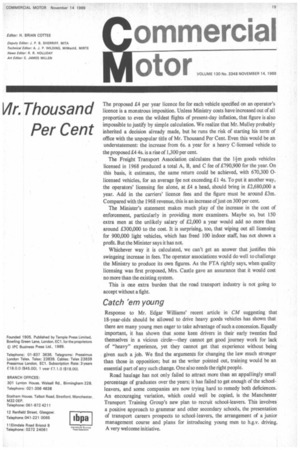Wr.Thousand Per Cent
Page 21

If you've noticed an error in this article please click here to report it so we can fix it.
The proposed £4 per year licence fee for each vehicle specified on an operator's licence is a monstrous imposition. Unless Ministry costs have increased out of all proportion to even the wildest flights of present-day inflation, that figure is also impossible to justify by simple calculation. We realize that Mr. Mulley probably inherited a decision already made, but he runs the risk of starting his term of office with the unpopular title of Mr. Thousand Per Cent. Even this would be an understatement: the increase from 6s. a year for a heavy C-licensed vehicle to the proposed £4 4s. is a rise of 1,300 per cent.
The Freight Transport Association calculates that the 1 '7,m goods vehicles licensed in 1968 produced a total A, B, and C fee of £790,900 for the year. On this basis, it estimates, the same return could be achieved, with 670,300 0licensed vehicles, for an average fee not exceeding £1 4s. To put it another way, the operators' licensing fee alone, at £4 a head, should bring in £2,680,000 a year. Add in the carriers' licence fees and the figure must be around £3m. Compared with the 1968 revenue, this is an increase of just on 300 per cent.
The Minister's statement makes much play of the increase in the cost of enforcement, particularly in providing more examiners. Maybe so, but 150 extra men at the unlikely salary of £2,000 a year would add no more than around £300,000 to the cost. It is surprising, too, that wiping out all licensing for 900,000 light vehicles, which has freed 100 indoor staff, has not shown a profit. But the Minister says it has not.
Whichever way it is calculated, we can't get an answer that justifies this swingeing increase in fees. The operator associations would do well to challenge the Ministry to produce its own figures. As the FTA rightly says, when quality licensing was first proposed, Mrs. Castle gave an assurance that it would cost no more than the existing system.
This is one extra burden that the road transport industry is not going to accept without a fight.
Catch 'em young
Response to Mr. Edgar Williams' recent article in CM suggesting that 18-year-olds should be allowed to drive heavy goods vehicles has shown that there are many young men eager to take advantage of such a concession. Equally important, it has shown that some keen drivers in their early twenties find themselves in a vicious circle—they cannot get good journey work for lack of "heavy" experience, yet they cannot get that experience without being given such a job. We find the arguments for changing the law much stronger than those in opposition; but as the writer pointed out, training would be an essential part of any such change. One al so needs the right people.
Road haulage has not only failed to attract more than an appallingly small percentage of graduates over the years; it has failed to get enough of the schoolleavers, and some companies are now trying hard to remedy both deficiences. An encouraging variation, which could well be copied, is the Manchester Transport Training Group's new plan to recruit school-leavers. This involves a positive approach to grammar and other secondary schools, the presentation of transport careers prospects to school-leavers, the arrangement of a junior management course and plans for introducing young men to h.g.v. driving. A very welcome initiative.




















































































































